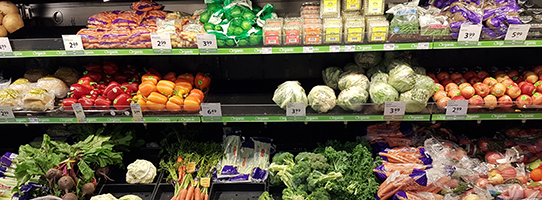A strategy to faciltate the marketing of locally produced food and food products

Supermarkets are importing food rather than using local produce.
Why so much of our food is imported
It is often cheaper for supermarkets to import food than to buy food produced locally even though transportation costs are much higher. Much of that has to do with significantly higher labour costs here. However an equally important obstacle is our inefficient food processing and marketing system which makes it difficult to provide a reliable and consistent product in sufficient quantity at a reasonable price throughout the year. It is especially difficult for small producers with limited food processing facilities to access the system.
Why we need to source more of our food locally
Covid has taught us that supply chains are easily disrupted. Global warming will increase the growing season in BC while disrupting agriculture in California and Mexico where much of the produce that we consume is currently grown. Transporting food long distances creates significant greenhouse gas emissions, another reason to grow our food close to where it is consumed.
What Council can do to turn the situation around
Council can look into providing co-op and rental housing near farmland serving a number of small farms for permanent and seasonal farm workers to make agricultural work more attractive to both young people and temporary immigrants. Council can also facilitate the organization of provincially financed food hubs which enable cooperative food processing and marketing for small farmers to provide consistent products in larger quantities and keep prices reasonable. This would ideally be done in collaboration with the supermarket chains.
Other Richmond Issues

More rental housing in the City Centre rather than strata condos for investors
There continues to be an acute shortage of market rental housing units in Richmond's City Centre and yet Council only makes feeble token efforts to do something about it. It is important to require substantial rental housing in major new housing developments.
Read more here.

Limit property tax increases to the rate of inflation while maintaining services
In this time of financial hardship due to Covid, property tax increases should be kept close to the rate of inflation which is forecast to be 1.6 – 2% in 2021.
Read more here.

Save our large trees and reduce our emissions from heating and cooling
There should be much higher fees to remove large trees that provide shade, oxygen production, carbon storage, bird and animal habitat, and natural beauty.
Read more here.

More support for young farmers starting out, not mega mansions taking farmland out of production
Non-farmers have been buying up Richmond farmland in order to build mega mansions that make it difficult to farm the land. Farmland prices are beyond what any farmer can afford.
Read more here.

More intercultural mutual respect, not isolation and mistrust
Both immigration and housing prices have increased dramatically. Foreign language signage has been an issue. These have resulted in inter-cultural isolation and mistrust.
Read more here.
